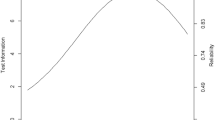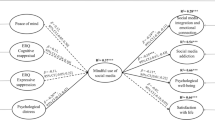Abstract
TikTok is a highly popular social media application that involves exposure to video content that is presumably personally relevant and highly engaging. Given TikTok’s rapidly increasing use, empirical attention to its association with mood, affect, and general well-being is needed, similar to what has been conducted with other popular social media applications. This study examined the association between experimentally assigned TikTok use and changes in mood, stress, boredom, and perceived connectedness to others informed by Uses and Gratifications Theory. Participants’ self-reported typical engagement with TikTok was also investigated in relation to self-perception variables such as loneliness, fear of missing out (FOMO), and life satisfaction. The sample consisted of 252 undergraduate students (ages 18 to 30; 69.8% female) who were randomly assigned to either use TikTok, use their electronic device (e.g., phone, laptop) without accessing TikTok, or have no access to an electronic device for 20 min. Participants assigned to use TikTok for 20 min reported decreased stress and lower connectedness to others after 20 min. Screen use without TikTok was associated with higher boredom than use of TikTok after 20 min and with higher stress than use of no screens. Self-reported TikTok use during daily activities was associated with self-reported fear of missing out (FOMO). The results appear to indicate potential benefits and drawbacks of TikTok use, at least for short durations, as well as point to intrapersonal variables that are associated with greater day-to-day TikTok use.




Similar content being viewed by others
Data Availability
All study data are available from the first author upon reasonable request.
References
Barry, C. T., Doucette, H., Loflin, D. C., Rivera-Hudson, N. J., & Herrington, L. L. (2017). ‘Let me take a selfie:’ Associations between self-photography, narcissism, and self-esteem. Psychology of Popular Media Culture, 6, 48–60.
Barry, C. T., Moran-Miller, K., Levy, H. F., & Gray, T. A. (2022). Social media engagement, perceptions of social media costs and benefits, and well-being in college student-athletes. Journal of American College Health. https://doi.org/10.1080/07448481.2022.2142797
Barry, C. T., Sidoti, C. L., Anderson, M. A., Benson, C. S., & Sawyer, D. R. (2020). Self-perception, personality, and observed activity on Snapchat. The Journal of Social Media in Society, 9(2), 258–274.
Barry, C. T., & Wong, M. Y. (2020). Fear of missing out (FoMO): A generational phenomenon or an individual difference? Journal of Social and Personal Relationships, 37, 2952–2966. https://doi.org/10.1177/0265407520945394
Beyens, I., Pouwels, J. L., Van Driel, I. I., Keijsers, L., & Valkenburg, P. M. (2020). Social media use and adolescents’ well-being: Developing a typology of person-specific effect patterns. Communication Research. https://doi.org/10.1177/00936502211038196
Boer, M., van den Eijnden, R. J. J.M., Boniel-Nissim, M., Wong, S., Inchley, J. C., Badura, P., … & Stevens, G. W. J. M. (2020). Adolescents' intense and problematic social media use and their well-being in 29 countries. Journal of Adolescent Health, 66, S89–S99. https://doi.org/10.1016/j.jadohealth.2020.02.014
Curry, D. (2021). Most popular apps (2023). Retrieved February 13, 2023 from https://www.businessofapps.com/data/most-popular-apps/
Diener, E., Emmons, R. A., Larsen, R. J., & Griffin, S. (1985). The Satisfaction with Life Scale. Journal of Personality Assessment, 49, 71–75.
Harness, J., & Getzen, H. (2022). TikTok’s sick-role subculture and what to do about it. Journal of the American Academy of Child & Adolescent Psychiatry, 61(3), 351–353. https://doi.org/10.1016/j.jaac.2021.09.312
Hunt, M. G., Marx, R., Lipson, C., & Young, J. (2018). No more FOMO: Limiting social media decreases loneliness and depression. Journal of Social and Clinical Psychology, 37(10), 751–768. https://doi.org/10.1521/jscp.2018.37.10.751
Katz, E., Blumler, J. G., & Gurevitch, M. (1973). Uses and gratifications research. Public Opinion Quarterly, 37(4), 509–523. http://www.jstor.org/stable/2747854
Mackson, S. B., Prochu, P. M., & Schneider, B. A. (2019). Instagram: Friend or foe? The applications association with psychological well-being. New Media & Society, 21(10), 2160–2181. https://doi.org/10.1177/1461444819840021
Manago, A. M., Walsh, A. S., & Barsigian, L. L. (2023). The contributions of gender identification and gender ideologies to the purposes of social media use in adolescence. Frontiers in Psychology, 13. https://doi.org/10.3389/fpsyg.2022.1011951
Nuzuli, A. K. (2022). Motives for using Tik Tok in uses and gratification theory perspective. KOMUNIKA: Jurnal Dakwah Dan Komunikasi, 16(1), 15–26. https://doi.org/10.24090/komunika.v16i1.4787
O’Day, E. B., & Heimberg, R. G. (2021). Social media use, social anxiety, and loneliness: A systematic review. Computers in Human Behavior Reports, 3, 100070. https://doi.org/10.1016/j.chbr.2021.100070
Oberst, U., Wegmann, E., Stodt, B., Brand, M., & Chamarro, A. (2017). Negative consequences from heaving social networking in adolescents: The mediating role of fear of missing out. Journal of Adolescence, 55, 51–60. https://doi.org/10.1016/j.adolescence.2016.12.008
Omar, B., & Dequan, W. (2020). Watch, share, or create: The influence of personality traits and user motivation TikTok Mobile video usage. International Journal of Interactive Mobile Technologies, 14(04), 121. https://doi.org/10.3991/ijim.v14i04.12429
Pittman, M., & Reich, B. (2016). Social media and loneliness: Why an Instagram picture may be worth more than a thousand Twitter words. Computers in Human Behavior, 62, 155–167. https://doi.org/10.1016/j.chb.2016.03.084
Przybylski, A. K., Murayama, K., DeHaan, C. R., & Gladwell, V. (2013). Motivational, emotional, and behavioral correlates of fear of missing out. Computers in Human Behavior, 29, 1841–1848. https://doi.org/10.1016/j.chb.2013.02.014
Roberts, J. A., & David, M. E. (2023). Intagram and tiktok flow states and their association with psychological well-being. Cyberpsychology, Behavior, and Social Networking. https://doi.org/10.1089/cyber.2022.0117
Russell, D. (1996). UCLA Loneliness Scale (Version 3): Reliability, validity, and factor structure. Journal of Personality Assessment, 66, 20–40. PMID: 8576833.
Scherr, S., & Wang, K. (2021). Explaining the success of social media with gratification niches: Motivations behind daytime, nighttime, and use of TikTok in China. Computers in Human Behavior, 124, 106893. https://doi.org/10.1016/j.chb.2021.106893
Southern, M. G. (2021). TikTok beats Facebook in time spent per user. Retrieved February 9, 2023 from https://www.searchenginejournal.com/tiktok-beats-facebook-in-time-spent-per-user/392643/?itm_source=site-search&itm_medium=site-search&itm_campaign=site-search
Sundar, S. S. (2008). The MAIN model: A heuristic approach to understanding technology effects on credibility. In M. J. Metzger, & A. J. Flanagin (Eds.), Digital media, youth, and credibility (pp. 72–100). Cambridge, MA: The MIT Press. https://doi.org/10.1162/dmal.9780262562324.073.
Timpano, K. R., & Beard, C. (2020). Social networking and mental health: Looking beyond frequency of use and towards mechanisms of action. Neuropsychopharmacology, 45(6), 905–906. https://doi.org/10.1038/s41386-020-0629-8
Twenge, J. M., Spitzberg, B. H., & Campbell, W. K. (2019). Less in-person social interaction with peers among U.S. adolescents in the 21st century and links to loneliness. Journal of Social and Personal Relationships, 36, 1892–1913. https://doi.org/10.1177/0265407519836170
Valkenburg, P. M. (2022). Theoretical foundations of social media uses and effects. In J. Nesi, E. H. Telzer, & M. J. Prinstein (Eds.), Handbook of Adolescent Digital Media Use and Mental Health (pp. 39–60). Cambridge University Press.
Verduyn, P., Ybarra, O., Résibois, M., Jonides, J., & Kross, E. (2017). Do social network sites enhance or undermine subjective well-being? A critical review. Social Issues and Policy Review, 11(1), 274–302. https://doi.org/10.1111/sipr.12033
Wallaroo Media. (2023). TikTok Statistics Updated January 2023. Available at: https://wallaroomedia.com/blog/social-media/tiktok-statistics/. Accessed January 18, 2023.
Whelan, E., Najmul Islam, A. K., & Brooks, S. (2020). Is boredom proneness related to social media overload and fatigue? A stress–strain–outcome approach. Internet Research, 30(3), 869–887. https://doi.org/10.1108/INTR-03-2019-0112
Whiting, A., & Williams, D. (2013). Why people use social media: A uses and gratifications approach. Qualitative Market Research, 16(4), 362–369. https://doi.org/10.1108/QMR-06-2013-0041
Yang, C. (2016). Instagram use, loneliness, and social comparison orientation: Interact and browse on social media, but don’t compare. Cyberpsychology, Behavior, and Social Networking, 19(12), 703–708. https://doi.org/10.1080/cyber.2016.0201
Yeung, A., Ng, E., & Abi-Jaoude, E. (2022). TikTok and attention-deficit/hyperactivity disorder: A cross-sectional study of social media content quality. The Canadian Journal of Psychiatry, 67(12), 899–906. https://doi.org/10.1177/07067437221082854
Author information
Authors and Affiliations
Corresponding author
Ethics declarations
Ethics Approval
This study was approved by the Institutional Review Board at the first author’s affiliated university (IRB No. 19324–001).
Consent to Participate
All participants consented to participate in this study.
Consent for Publication
All participants consented for results of this study to be published.
Competing Interests
The authors declare no competing interests.
Additional information
Publisher's Note
Springer Nature remains neutral with regard to jurisdictional claims in published maps and institutional affiliations.
Appendix: TikTok Engagement Questionnaire
Appendix: TikTok Engagement Questionnaire
-
1.
Do you have TikTok downloaded on your smart phone?
-
2.
On a typical week, how many days do you use TikTok? (0–7 days a week).
-
3.
When you use TikTok, for how long do you usually stay on it? (less than 15 min; 15–30 min; more than 30 min; more than 1 h; more than 2 h).
TikTok use during daily activities:
For the following items, please respond on the following scale:
1 = Never 2 = Sometimes 3 = Often 4 = Always.
-
1.
I’m on TikTok in the 15 min after I wake up.
-
2.
I’m on TikTok while eating meals.
-
3.
I’m on TikTok while studying/doing homework.
-
4.
I’m on TikTok during meetings.
-
5.
I’m on TikTok during outings with friends.
-
6.
I’m on TikTok while watching TV/movies.
-
7.
I’m on TikTok in the 15 min before I go to sleep.
Rights and permissions
Springer Nature or its licensor (e.g. a society or other partner) holds exclusive rights to this article under a publishing agreement with the author(s) or other rightsholder(s); author self-archiving of the accepted manuscript version of this article is solely governed by the terms of such publishing agreement and applicable law.
About this article
Cite this article
Barry, C.T., Berbano, MI., Anderson, A. et al. Psychology Tok: Use of TikTok, Mood, and Self-Perception in a Sample of College Students. J. technol. behav. sci. (2024). https://doi.org/10.1007/s41347-024-00390-1
Received:
Revised:
Accepted:
Published:
DOI: https://doi.org/10.1007/s41347-024-00390-1




